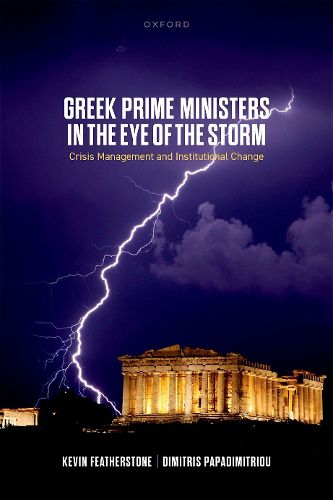Readings Newsletter
Become a Readings Member to make your shopping experience even easier.
Sign in or sign up for free!
You’re not far away from qualifying for FREE standard shipping within Australia
You’ve qualified for FREE standard shipping within Australia
The cart is loading…






When, and how, might crises force institutions to change? Crisis management prompts expectations of exceptional behaviour, leaders raising their 'game', and of being empowered. The Greek crisis of 2009-18 was severe: threatening bankruptcy and Greece's exit from the euro. Yet, in a previous study of 2015, Featherstone and Papadimitriou identified key institutional weaknesses embedded within Greek governments: of poor central control and coordination, the very qualities needed in a crisis. So, how far did the crisis in Greece enable actors to overcome these critical weaknesses? What lessons were drawn, and when?Exploring change in a crisis requires careful case study. Drawing on interviews with an extensive range of personnel, including each crisis Greek prime minister, the authors meticulously explore how the four prime ministers of the period handled the challenges of crisis management. In doing so, they apply an original analytical frame.They then place the Greek case in a wider, comparative perspective, contributing to studies of crisis leadership, crisis management, core executives, and the utility of external loan conditionality. There are implications for the capacity to reform in particular domestic settings and the ability of external actors like the European Union to leverage such reform. In a heterogeneous Europe, these are issues of likely continuing importance.
$9.00 standard shipping within Australia
FREE standard shipping within Australia for orders over $100.00
Express & International shipping calculated at checkout
When, and how, might crises force institutions to change? Crisis management prompts expectations of exceptional behaviour, leaders raising their 'game', and of being empowered. The Greek crisis of 2009-18 was severe: threatening bankruptcy and Greece's exit from the euro. Yet, in a previous study of 2015, Featherstone and Papadimitriou identified key institutional weaknesses embedded within Greek governments: of poor central control and coordination, the very qualities needed in a crisis. So, how far did the crisis in Greece enable actors to overcome these critical weaknesses? What lessons were drawn, and when?Exploring change in a crisis requires careful case study. Drawing on interviews with an extensive range of personnel, including each crisis Greek prime minister, the authors meticulously explore how the four prime ministers of the period handled the challenges of crisis management. In doing so, they apply an original analytical frame.They then place the Greek case in a wider, comparative perspective, contributing to studies of crisis leadership, crisis management, core executives, and the utility of external loan conditionality. There are implications for the capacity to reform in particular domestic settings and the ability of external actors like the European Union to leverage such reform. In a heterogeneous Europe, these are issues of likely continuing importance.